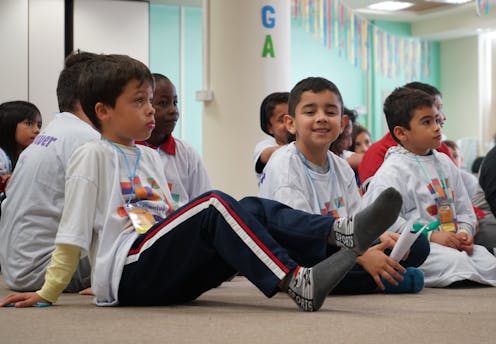Teaching kids social responsibility – like how to settle fights and ask for help – can reduce school bullying
- Written by Jonathan B. Santo, Professor of Psychology, University of Nebraska Omaha

The Research Brief[1] is a short take about interesting academic work.
The big idea
Schools that encourage their students to care for their classmates’ feelings and to peacefully resolve conflicts with their peers can lower incidents of bullying, according to our peer-reviewed study[2] published in the International Journal of Behavioral Development in June 2021.
We surveyed 1,850 Brazilian schoolchildren ages 7 to 15 and their teachers over a three-month period in 2019 – shortly before the COVID-19 pandemic disrupted in-person instruction. The teachers were working to cultivate these social responsibility skills among their students.
Students who said their teachers encouraged them to care about others and work together to settle disputes, and fostered a classroom environment with clear rules, also said they felt both less aggressive and less victimized by their classmates.
Specifically, there was a 34% decrease at the end of the period in reported incidents of hitting, kicking, pushing, spreading rumors and leaving people out. Students said that a supportive classroom climate was the main reason for the decrease.
Why it matters
Around the world, including in the U.S., over half of children and adolescents say they are victimized by their classmates[3], with at least 10% being bullied repeatedly.
When children help each other out and cooperate to resolve conflicts, they are exercising what psychologists call “social responsibility[4]” by contributing to the greater good of a group.
School can nurture social responsibility by fostering an environment that combines fairness and positive social connections with opportunities for students to learn and model ways to be kind and include others. For example, teachers can encourage students to feel responsible for their actions, help others and seek assistance when in need.
Additionally, no one knows[5] how the social distancing required by the COVID-19 pandemic will affect the children and teens who are growing up today, in Brazil or anywhere else. But it seems likely that the decline in interactions will take some kind of toll.
We believe it’s important that schools focus on children’s social and emotional well-being both during and after the pandemic.
What still isn’t known
Brazil had registered over 17 million COVID-19 cases[6], including over 480,000 deaths, as of June 2021 – more than any other country except the U.S. and India. Many Brazilian K-12 schools, as in the U.S., pivoted to remote instruction in early 2020.
The techniques used by teachers in our study might help to cultivate positive connections and foster a resilient response to the pandemic[7] – in Brazil, the U.S. and elsewhere – among children, families, schools and communities. As for how exactly social responsibility can help accelerate this recovery, more evidence-based research is needed.
What’s next
We are conducting rapid-response surveys and interviews with schoolteachers and designing new programs, such as new lesson plans for remote learning, including for children without internet access. We are also deploying program activities through social media and online learning platforms[8] to help children to continue learning these skills and also nurture a sense of connection in their remote schooling activities.
Our next goal is to study how fostering social responsibility in children contributes to the development of engaged and responsible citizenship as students grow up. We want to understand new ways to create opportunities for children and adolescents to actively engage and contribute to the well-being of their communities.
[The Conversation’s newsletter explains what’s going on with the coronavirus pandemic. Subscribe now[9].]
References
- ^ Research Brief (theconversation.com)
- ^ peer-reviewed study (doi.org)
- ^ victimized by their classmates (www.sciencedaily.com)
- ^ social responsibility (doi.org)
- ^ no one knows (www.seattletimes.com)
- ^ over 17 million COVID-19 cases (coronavirus.jhu.edu)
- ^ foster a resilient response to the pandemic (doi.org)
- ^ social media and online learning platforms (programadiga.com.br)
- ^ Subscribe now (theconversation.com)

















